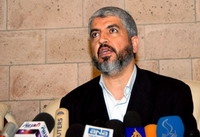Arab nations to participate in US-sponsored Mideast peace conference
Arab nations will take part in a U.S.-sponsored Mideast peace conference, though Israel being in question. In a sign of the skepticism, the Saudi foreign minister cautioned there would be no dramatic handshakes with Israeli officials.

The announcement marked a success for the United States, which had pushed hard for regional powerhouse Saudi Arabia to attend the conference Tuesday in Annapolis, Maryland. But still unclear was whether the other major hold-out, Syria, will show up.
Even after Arab foreign ministers meeting in Cairo announced Friday they would attend, Syrian Foreign Minister Walid al-Moallem said Damascus was waiting to see if the conference would address its priority issue - the Israeli-held Golan Heights.
The conference is to launch Israeli-Palestinian peace negotiations for the first time in seven years, and Washington has hoped for a strong Arab presence at Annapolis to show support.
But Arab leaders made clear they were on board in part to ensure that the weakened Palestinian President Mahmoud Abbas does not make any damaging concessions to Israel in future negotiations for a final peace deal. Israel has dangled the possibility of an agreement as early as the end of 2008.
Asked if Abbas has a free rein to negotiate an agreement, Arab League chief Amr Moussa underlined that Arab countries would not back any deal that doesn't meet an Arab peace plan calling for a return of all lands Israel seized in the 1967 war.
"I repeat again and again that we are governed by the Arab initiative in all behaviors and ... and in our agreement to end the Arab-Israeli conflict," he told reporters after a league meeting in Cairo at which Arab countries decided to send their foreign ministers to Annapolis.
Arab countries - particularly Saudi Arabia, which has no diplomatic relations with Israel - have worried that the Annapolis conference would corner them into a high-profile meeting with Israel without securing any commitments about the future shape of peace.
Saudi Foreign Minister Saud al-Faisal said that while he was going to Annapolis, he would not be joining in any centerpiece Arab-Israeli handshakes that U.S. officials have engineered at past conferences, such as the one between then-Israeli and Palestinian leaders Yitzhak Rabin and Yasser Arafat in 1993.
"I'm not hiding any secret about the Saudi position. We were reluctant until today. And if not for the Arab consensus we felt today, we would not have decided to go," he said in Cairo.
"We are not prepared to take part in a theatrical show, in handshakes and meetings that don't express political positions. We are going with seriousness and we work on the same seriousness and credibility," he said.
Saudi Arabia want Annapolis will secure a promise that negotiations would tacklethe core issues of the Israeli-Palestinian conflict - such as borders of a Palestinian state, the status of Jerusalem and the fate of refugees. It also wanted a timetable for talks, a mechanism to ensure progress and a commitment to the Arab peace plan.
In the end, they have been unable to get such promises on paper.
Israeli Prime Minister Ehud Olmert said this week that negotiations would address the core issues and that a deal could be reached in 2008. But Israel has opposed a formal timetable and a specific mention of the major issues in a joint declaration that is expected to be issued at Annapolis.
Still, al-Faisal said the Arabs were attending because they saw a real chance for peace. "For the first time, we felt real seriousness (from Israel) - not out of good intentions but of out of real public opinion that they want real peace in the region," he said.
The United States had pressured the kingdom heavily to send al-Faisal, rather than a lower-level figure, with President George W. Bush speaking by phone with Saudi King Abdullah earlier this week. The U.S. won Egypt's key endorsement of the conference, securing its help in bringing Saudi involvement.
Israel welcomed the news that al-Faisal would attend, with Foreign Ministry spokesman Mark Regev calling it a "positive development."
"We hope this is only the beginning and that we will see greater and broader Arab involvement in the peace process," he said. "For this process to succeed, both Arabs and Israelis will have to take bold steps."
Saudi Arabia, as well as Syria, attended the 1991 Madrid peace conference that brought together Israel and Arab countries. But the kingdom and other Arab nations have been cautious over any steps that would be seen as "normalization" with Israel before it returns Arab lands.
The Arab League decision, made after intense discussions late Thursday and Friday, meant that the members of a league committee tasked earlier this year with dealing with the peace process will attend Annapolis. Those countries include Algeria, Bahrain, Egypt, Jordan, Lebanon, Morocco, Qatar, Saudi Arabia, Sudan, Syria, Tunisia and Yemen.
But Syria - an ally of Iran - was keeping Washington guessing. The Arab decision to attend was a collective one, including Syria. But Syria's al-Moallem told reporters, "We haven't made a decision to participate until we receive the agenda of the conference and read it to find an item addressing the Syrian-Israeli track, meaning the occupied Golan Heights."
U.S. Secretary of State Condoleezza Rice said there would be room at Annapolis to discuss the Golan.
Asked about Syria, Moussa said "final arrangements" had to be made. He said Arab foreign ministers would meet again in Washington on Monday, a day before the Annapolis conference.
Subscribe to Pravda.Ru Telegram channel, Facebook, RSS!




